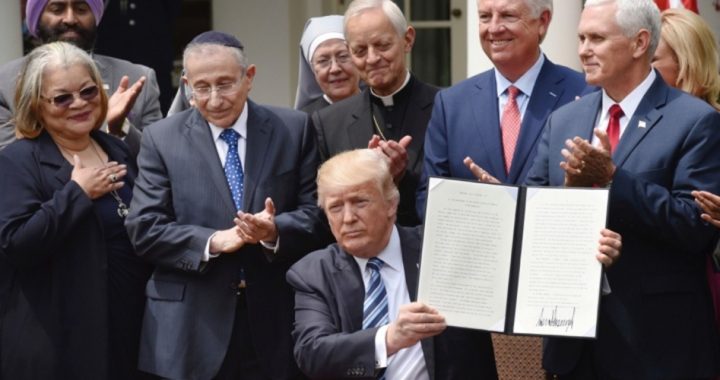
President Donald Trump signed his much-anticipated executive order expanding religious freedom, the Executive Order on Promoting Free Speech and Religious Liberty, in the Rose Garden on Thursday, the nation’s National Day of Prayer. Said Trump to the religious leaders gathered there, “For too long the federal government has used the state as a weapon against people of faith.” After announcing his order, he added “You’re now in a position to say what you want to say … no one should be censoring sermons or targeting pastors.”
Trump was referring to the Johnson Amendment, proposed by then-Senator Lyndon B. Johnson and passed into law as part of the Internal Revenue Code of 1954. The law extended the power of the Internal Revenue Service (IRS) to prohibit all manner of political speech and action by non-profits, under threat of revocation of their tax-exempt status. It has been rarely enforced, but stands is an imminent and ever-present threat to churches and other tax-exempt groups.
Chief Counsel of the American Center for Law and Justice (ACLJ) Jay Sekulow called the Johnson Amendment a “federal law that prevents religious leaders from truly exercising their constitutionally-protected free speech rights when they act in their official capacity as a pastor or head of a religious, tax-exempt organization.” This law goes far beyond the original purpose of the IRS, said Sekulow, turning it from a tax-collection agency into “speech police.”
Sekulow added that the Johnson Amendment makes no sense: “It is permissible for religious leaders to discuss important issues of public policy (as they should), but are prohibited from supporting or opposing a candidate who takes positions on those issues. That’s absurd. The prohibition makes no sense.”
Ralph Reed, chairman of the Faith & Freedom Coalition, referred to the prohibition as the ever-present “sword” as he rejoiced in learning of Trump’s order: “President Trump’s executive order removes a sword of Damocles that has hung over the faith community for decades by administratively repealing the Johnson Amendment and restoring the right to political speech by pastors, churches and ministries.”
Trump’s executive order didn’t repeal the Johnson Amendment — only the Congress can do that — but it does set the stage of inclusion of that repeal in the budget being hammered together on the hill. Until then, the IRS isn’t likely to change its stance on the rule, which it has rarely enforced. It has instead relied on the potential threat as a way to squelch political speech and action by churches and non-profits, which has worked just as well in neutering and emasculating such “politically incorrect” behavior.
The president’s executive order was significantly narrower than the one the Trump administration leaked back in February as a trial balloon on the matter. His order offered unspecified “regulatory relief” for religious objectors to an ObamaCare mandate concerning paying for contraception services as part of the healthcare plan. How it might affect present cases such as that of the Denver baker who refused to bake a cake for a same-sex wedding ceremony, the Albuquerque wedding photographer who refused to take pictures of a same-sex commitment ceremony, or the Kentucky county clerk who refused to issue marriage licenses to same-sex couples for religious reasons, remains to be seen. Further, it seems that the new order does not technically allow pastors and other religious leaders to engage in support of or opposition to political candidates. From the text of the order:
In particular, the Secretary of the Treasury shall ensure, to the extent permitted by law, that the Department of the Treasury does not take any adverse action against any individual, house of worship, or other religious organization on the basis that such individual or organization speaks or has spoken about moral or political issues from a religious perspective, where speech of similar character has, consistent with law, not ordinarily been treated as participation or intervention in a political campaign on behalf of (or in opposition to) a candidate for public office by the Department of the Treasury.
So taking a religious perspective on moral or political issues is fine, where such speech is not considered by the Department of Treasury as being made on behalf of or in opposition to a candidate for public office. How this plays out in the real world remains to be seen.
Nevertheless, progressives are already preparing legal challenges to the president’s order. Camilla Taylor, senior counsel for Lambda Legal, said that her firm had already begun preparing a legal strategy to oppose it, lining up various gay, lesbian, bisexual, and transgender people who are willing to claim they have been discriminated against by order.
Photo: AP Images
An Ivy League graduate and former investment advisor, Bob is a regular contributor to The New American magazine and blogs frequently at LightFromTheRight.com, primarily on economics and politics. He can be reached at [email protected].
Related article:



